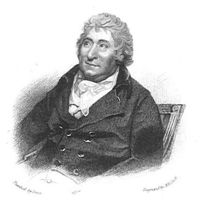Annotation:Jack Ratlin: Difference between revisions
(Created page with "=='''Back to [[{{BASEPAGENAME}}]]'''== ---- <p><font face="garamond, serif" size="4"> '''JACK RATLIN.''' English, Air (whole time). D Major. Standard tuning (fiddle). One part...") |
m (Text replacement - "garamond, serif" to "sans-serif") |
||
| (5 intermediate revisions by one other user not shown) | |||
| Line 1: | Line 1: | ||
=='''Back to [[{{BASEPAGENAME}}]]'''== | =='''Back to [[{{BASEPAGENAME}}]]'''== | ||
---- | ---- | ||
<p><font face=" | <p><font face="sans-serif" size="4"> | ||
'''JACK RATLIN.''' English, Air (whole time). D Major. Standard tuning (fiddle). One part. | '''JACK RATLIN.''' AKA - "Jack Ratlin was the ablest seaman." English, Air (whole time). D Major. Standard tuning (fiddle). One part. The song composed by Charles Dibdin (1745-1814) in 1785 appears in several late 18th century songsters such as '''Calliope''' [http://digital.nls.uk/special-collections-of-printed-music/pageturner.cfm?id=91491365] (1788) and Sime's '''The Edinburgh Musical Miscellany''' (1793). Dibdin was a prolific composer and songwriter, and wrote numerous sea songs of which this was one of his most popular. It continued to be anthologized long into the 19th century. | ||
<br> | [[File:dibdin.jpg|200px|thumb|left|Charles Dibdin]] | ||
<br> | <blockquote> | ||
''Jack Ratlin was the ablest seaman,''<br> | |||
''None like him could hand, reef and steer;''<br> | |||
''No dang'rous toil but he'd encounter with skill and in contempt of fear.''<br> | |||
''In fight a lion, the battle ended,''<br> | |||
''Meek as the bleating lamb he'd prove,''<br> | |||
''Thus Jack had manners, courage, merit,''<br> | |||
''Yet he did sigh, and all for love.''<br> | |||
</blockquote> | |||
</font></p> | </font></p> | ||
<p><font face=" | <p><font face="sans-serif" size="4"> | ||
''Source for notated version'': | ''Source for notated version'': | ||
<br> | <br> | ||
<br> | <br> | ||
</font></p> | </font></p> | ||
<p><font face=" | <p><font face="sans-serif" size="4"> | ||
''Printed sources'': Aird ('''Selection of Scotch, English, Irish and Foreign Airs, vol. 5'''), Glasgow, 1797; No. 38, p. 15. | ''Printed sources'': Aird ('''Selection of Scotch, English, Irish and Foreign Airs, vol. 5'''), Glasgow, 1797; No. 38, p. 15. | ||
<br> | <br> | ||
<br> | <br> | ||
</font></p> | </font></p> | ||
<p><font face=" | <p><font face="sans-serif" size="4"> | ||
''Recorded sources'': <font color=teal></font> | ''Recorded sources'': <font color=teal></font> | ||
</font></p> | </font></p> | ||
Latest revision as of 13:28, 6 May 2019
Back to Jack Ratlin
JACK RATLIN. AKA - "Jack Ratlin was the ablest seaman." English, Air (whole time). D Major. Standard tuning (fiddle). One part. The song composed by Charles Dibdin (1745-1814) in 1785 appears in several late 18th century songsters such as Calliope [1] (1788) and Sime's The Edinburgh Musical Miscellany (1793). Dibdin was a prolific composer and songwriter, and wrote numerous sea songs of which this was one of his most popular. It continued to be anthologized long into the 19th century.

Jack Ratlin was the ablest seaman,
None like him could hand, reef and steer;
No dang'rous toil but he'd encounter with skill and in contempt of fear.
In fight a lion, the battle ended,
Meek as the bleating lamb he'd prove,
Thus Jack had manners, courage, merit,
Yet he did sigh, and all for love.
Source for notated version:
Printed sources: Aird (Selection of Scotch, English, Irish and Foreign Airs, vol. 5), Glasgow, 1797; No. 38, p. 15.
Recorded sources:
